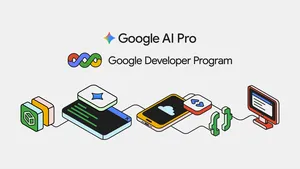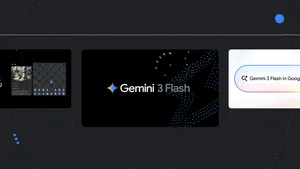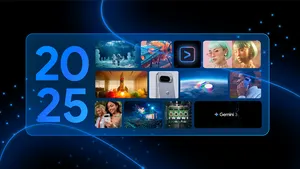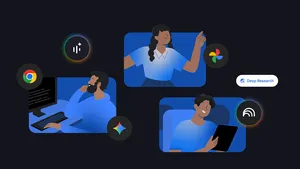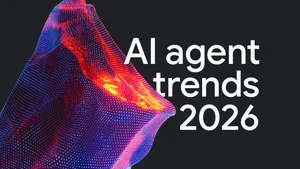How we created our Google AI Essentials course

In April, Grow with Google launched Google AI Essentials, a course to help everyone learn how to make the most of AI. It came after generative AI entered the mainstream in an explosion of new products and exciting cultural discourse. For many, it was a time to share imaginative AI-generated images and prompt their way to new discoveries. For others, it was a time of big questions: How should we be using these AI tools, anyway?
Anoop Sinha, Research Director for AI & Future Technologies on the Technology & Society team, realized how much potential lay in the public’s AI curiosity. “Something became very clear: There was an opportunity for Google to help the public understand this tech,” he says. He then began talking to SVP of Research, Technology & Society James Manyika, about how they might do just that.
“What kept coming up in our chats was that we had this really strong lever to pull: education,” Anoop says. “If we could help educate people about AI, we could fundamentally help them understand it, grow more comfortable with it and learn how to use it as an opportunity.”
Anoop teamed up with Grow with Google, and together they launched Google AI Essentials. Across five modules, the courses offer an intro to AI, tips for maximizing productivity in the workplace, strategies for writing effective prompts, an exploration of responsible AI, and tactics for staying ahead of the curve as the tech evolves. It’s packed with practical exercises — you’ll learn how to organize an event and unflood an inbox — as well as solid groundings in key concepts, like identifying AI’s potential biases.
The course is available globally in English, Spanish and Brazilian Portuguese and is coming soon in many other languages. You can complete it in less than 10 hours and zero experience is required.
“We designed AI Essentials with knowledge workers in mind — people who are creating, managing and sharing information,” Anoop says. “That’s a very large part of the economy, over 1 billion people globally. Many of those workers rely on our tools, from Search to Docs. With AI, roles are going to evolve, as is the workplace, and we want to empower as wide a group as possible to work with these shifts — and to thrive.”
To that end, we announced the course in tandem with a $75 million AI Opportunity Fund from Google.org, which will support workforce development and educational organizations across the U.S. as they teach more than 1 million Americans AI skills.
AI Essentials’ journey from proposal to reality was a cross-functional effort. Subject matter experts from multiple organizations within Google contributed to writing and designing course materials, from Google DeepMind, Education for Social Impact, Technology & Society, Google Research and beyond.
When it was time to beta test, testers took all five modules and provided feedback, like identifying sections that felt too theoretical.
In response to that feedback, the team decided to add more practical elements to the course, says Grow with Google Program Manager Yasmin Sanders Fathi, who led the development of AI Essentials. They created, for example, a five-point “Checklist for Responsible AI Use.” It includes action items like evaluating content before sharing it. “We thought this was a useful and hands-on approach to teaching a pretty theoretical concept,” Yasmin says.
Partners in the nonprofit, educational, commercial and government sectors also tested the course. “During the development stage, we put together a Content Advisory Group of top partners, and I had calls with them to ask about the challenges they are facing and how they want to incorporate AI in the workplace,” Yasmin says. “Then, when the syllabus was ready, they reviewed it and encouraged their workers and faculty members to beta test.”
Beta testers shared useful feedback with the team as well the ways in which AI Essentials helped them.

Feedback wasn’t the only thing that prompted the team to pivot at times. There were practical speed bumps, too, and the challenge of the constantly evolving technology itself.
"Many new generative AI products, such as video generation and code generation tools, were introduced after we started working on the course," Anoop says. "Exciting as they were, we stuck with our original mission — to efficiently provide curated content on the essentials. We carefully picked evergreen topics that are foundational for course participants, and provided enough information and additional pointers so that anyone taking the course can pick up and use newer tools as they emerge."
The team plans to update materials as necessary, and the final module, titled “Stay Ahead of the AI Curve,” is designed to help graduates be similarly nimble. In it, learners develop strategies for staying knowledgeable about the latest AI — one practical tip: set up a recurring meeting with a colleague to discuss new advances and tools — and are meant to think creatively about future uses of AI. If, for example, a multimodal model like MedPaLM can be specialized to help clinicians at work, how might a model be specialized to help with your line of work?
“I’m a knowledge worker myself, and this technology has become my own go-to over the last year. Whenever I’m stuck on something, or need more ideas or options, I just ask Gemini,” Yasmin says. “I can’t wait for people to speak the same lingo I’m now speaking every day in their own workplaces.”
